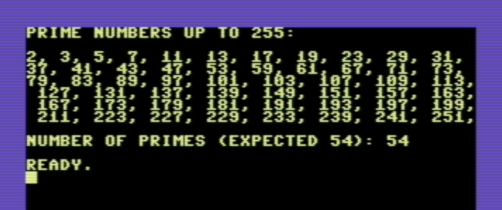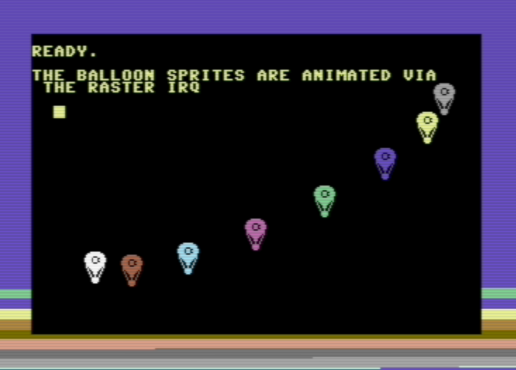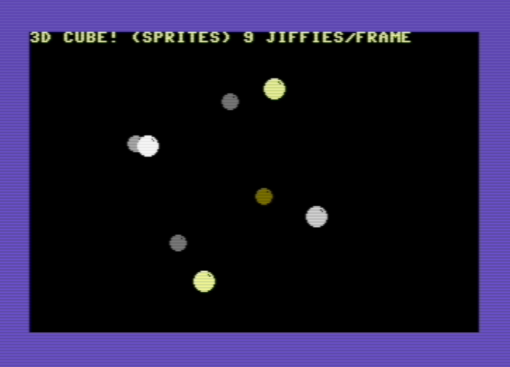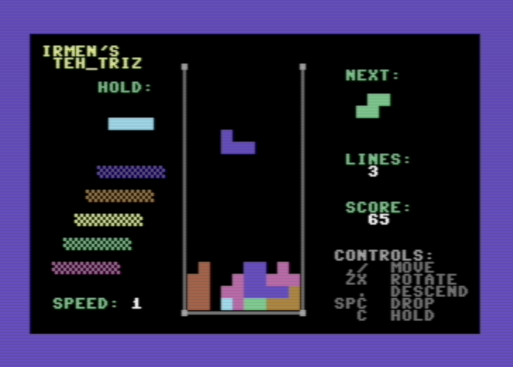Prog8 - Structured Programming Language for 8-bit 6502/6510 microprocessors
Written by Irmen de Jong (irmen@razorvine.net)
Software license: GNU GPL 3.0, see file LICENSE
This is a structured programming language for the 8-bit 6502/6510 microprocessor from the late 1970's and 1980's as used in many home computers from that era. It is a medium to low level programming language, which aims to provide many conveniences over raw assembly code (even when using a macro assembler):
- reduction of source code length
- modularity, symbol scoping, subroutines
- various data types other than just bytes (16-bit words, floats, strings)
- automatic variable allocations, automatic string and array variables and string sharing
- subroutines with a input- and output parameter signature
- constant folding in expressions
- conditional branches
- 'when' statement to provide a concise jump table alternative to if/elseif chains
- structs to group together sets of variables and manipulate them at once
- floating point operations (requires the C64 Basic ROM routines for this)
- abstracting away low level aspects such as ZeroPage handling, program startup, explicit memory addresses
- various code optimizations (code structure, logical and numerical expressions, unused code removal...)
- inline assembly allows you to have full control when every cycle or byte matters
- many built-in functions such as
sin,cos,rnd,abs,min,max,sqrt,msb,rol,ror,swap,memset,memcopy,sortandreverse
Rapid edit-compile-run-debug cycle:
- use modern PC to work on
- quick compilation times (seconds)
- option to automatically run the program in the Vice emulator
- breakpoints, that let the Vice emulator drop into the monitor if execution hits them
- source code labels automatically loaded in Vice emulator so it can show them in disassembly
- virtual machine that can execute compiled code directy on the host system, without having to actually convert it to assembly to run on a real 6502
It is mainly targeted at the Commodore-64 machine at this time. Contributions to add support for other 8-bit (or other?!) machines are welcome.
Documentation/manual
See https://prog8.readthedocs.io/
Required tools
64tass - cross assembler. Install this on your shell path. A recent .exe version of this tool for Windows can be obtained from my clone of this project. For other platforms it is very easy to compile it yourself (make ; make install).
A Java runtime (jre or jdk), version 8 or newer is required to run a prepackaged version of the compiler. If you want to build it from source, you'll need a Java SDK + Kotlin 1.3.x SDK (or for instance, IntelliJ IDEA with the Kotlin plugin).
It's handy to have a C-64 emulator or a real C-64 to run the programs on. The compiler assumes the presence of the Vice emulator
Example code
This code calculates prime numbers using the Sieve of Eratosthenes algorithm::
%import c64utils
%zeropage basicsafe
main {
ubyte[256] sieve
ubyte candidate_prime = 2
sub start() {
memset(sieve, 256, false)
c64scr.print("prime numbers up to 255:\n\n")
ubyte amount=0
while true {
ubyte prime = find_next_prime()
if prime==0
break
c64scr.print_ub(prime)
c64scr.print(", ")
amount++
}
c64.CHROUT('\n')
c64scr.print("number of primes (expected 54): ")
c64scr.print_ub(amount)
c64.CHROUT('\n')
}
sub find_next_prime() -> ubyte {
while sieve[candidate_prime] {
candidate_prime++
if candidate_prime==0
return 0
}
sieve[candidate_prime] = true
uword multiple = candidate_prime
while multiple < len(sieve) {
sieve[lsb(multiple)] = true
multiple += candidate_prime
}
return candidate_prime
}
}
when compiled an ran on a C-64 you'll get:
One of the included examples (wizzine.p8) animates a bunch of sprite balloons and looks like this:
Another example (cube3d-sprites.p8) draws the vertices of a rotating 3d cube:
If you want to play a video game, a fully working Tetris clone is included in the examples:




